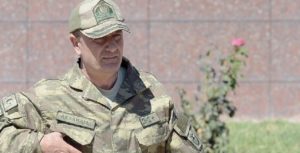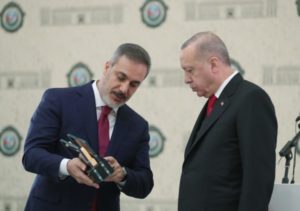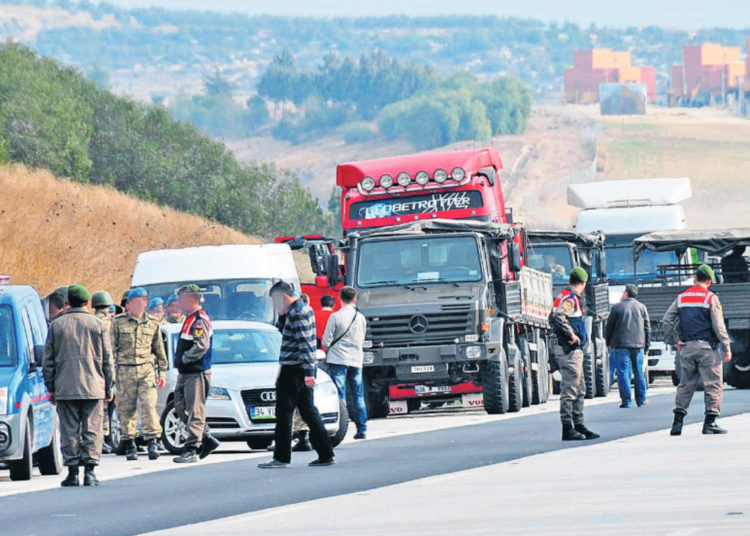Abdullah Bozkurt/Stockholm
The Turkish army’s elite Special Forces Command (Özel Kuvvetler Komutanlığı, or ÖKK) sent arms with their serial numbers filed off to Syria in order to prevent their being traced back to Turkey, the court testimony of a former member of the special forces has revealed.
According to the transcript of a hearing on July 18, 2018, a copy of which was obtained by Nordic Monitor, Maj. Gen. Zekai Aksakallı, the then-commander of the Special Forces, ordered that the serial numbers of guns which were to be sent to groups in Syria be filed off.
“Although we were the team that executed plans in the field, we weren’t told until the last moment how, when and to whom we would be delivering the weapons whose serial numbers we had worked overnight to erase,” said 38-year-old Capt. Mehmed Emin Tüzel during a hearing at the Ankara 17th High Criminal Court.
“From the moment the civil war in Syria began, we have taken on many missions to train, equip and arm anti-regime groups operating in the region in order to realize the foreign policy objectives pursued by our country,” he explained.
Stating that his commanders urged them not to question their mission and to act on a need-to-know basis, Tüzel said the commanders asked the special forces that train foreign fighters not to inquire which groups they belonged to.
Part of Mehmed Emin Tüzel’s testimony that revealed a shipment of arms with serial numbers erased to Syria:
Declining to provide further details on their cross-border missions on the grounds that they were classified as state secrets, Tüzel nevertheless pointed to Aksakallı as the commander who authorized secret missions. Aksakallı was working closely with Turkish President Recep Tayyip Erdoğan and coordinating the actions of the Special Forces with Turkish intelligence agency MIT, often bypassing General Staff headquarters.
Nordic Monitor previously reported how Aksakallı ordered snipers to shoot to kill soldiers of the Bashar al-Assad government in February or March 2016 in order to escalate the conflict and provoke Damascus.
Aksakallı was deliberately trying to drag Turkey into the Syrian quagmire because he was personally profiting from the war campaign, getting a cut of funds provided by third countries, especially Qatar, which had been financing jihadist fighters in Syria. He profited from the conflict and helped President Erdoğan enrich himself in the process as well.
“It was often the case that we didn’t know where and to whom the shipment [of arms] was delivered,” Tüzel said in court while defending himself against coup charges filed against him by the prosecutor.

On July 15, 2016 he and his team members were deployed to General Staff headquarters on orders from Aksakallı to provide security against a possible terrorist attack. It later turned out that the putschist attempt was a false flag orchestrated by President Erdogan and his intelligence and military chiefs. Tüzel and his comrades were framed and falsely accused of attempting to overthrow the government on dubious evidence. He was sentenced to serve 11 aggravated life sentences in sham trials.
This was not the first time some generals in the Turkish military and the leadership at MIT had planned a false flag operation to create more conflicts with Syria. In January 2019 a Turkish court confirmed the authenticity of a leaked audio clip in which top-ranking Turkish officials are heard discussing the possibility of an intervention in Syria in a false flag operation conducted by MİT. In the leaked recording then-Foreign Minister Ahmet Davutoğlu, then-Foreign Ministry Undersecretary Feridun Sinirlioğlu, MİT chief Hakan Fidan and then-Deputy Chief of General Staff Gen. Yaşar Güler are heard discussing military operations in Syria in Davutoğlu’s Foreign Ministry office on March 13, 2013.

Fidan says in the recording: “If needed, I would dispatch four men to Syria. [Then] I would have them fire eight mortar shells at the Turkish side and create an excuse for war.”
The judicial confirmation of the scandalous content was inadvertently revealed when the public prosecutor tried to pin the leak on a group critical of the government of President Erdogan as part of espionage charges. The statements in the leak, included in the indictment as allegations, were formally confirmed by the Ankara 4th High Criminal Court in a reasoned decision that was announced on Jan. 16, 2019.
Aksakallı’s plan to drag Turkey further into the Syrian civil war was opposed by Brig. Gen. Semih Terzi, the number two in the Special Forces Command. Terzi dispatched several reports to the General, Staff protesting Aksakallı’s clandestine and illegal operations with MIT, but he was executed on July 15, 2016 under orders from Aksakallı, who gave repeated instructions to his aide to kill Terzi.
Aksakallı was never tried in Turkey for the crimes he was accused of, and in fact Erdoğan promoted him to the rank of lieutenant general, although he was supposed to serve as a major general for another year, and made him commander of the 2nd Corps. With the opposition in the General Staff sidelined, Erdoğan charged him with executing a military incursion into Syria in August 2016. He retired from the service in 2020.












